#totc part 1
Explore tagged Tumblr posts
Note
hexter my man give us some totc!hugo analysis pre- and post-reset i beg
Yeah man ofc!
This got long so its under the cut :)
Part i
c!hugo starts off as kinda a background archivist. Doesn't do a whole lot until the morse code comes out, at which point he's like wait. Bc he spent most of his life before Viana on boats!! so ofc he's interested in doing the morse code bc it comes easy. And from that point he ends up working with the others and really begins to idolise Lume (something something respect must be earned.) And that's something he sticks with. So when Astraea starts turning everything south he still doesn't really recognize her as in charge. Sure she's making these threats and they're even coming true, but that's not exactly something he's going to take as authority. So of course, while Astraea is making her MO clear to the archivists, he's quietly making his clear to her. Something he says honestly a fair few times is that he doesn't care which side of history he stands on, he just cares that he's standing, which pretty much means that no matter what happens or how bad he needs to become, as long as he doesn't compromise on his own values he'll do it. And in this situation his values are;
- Loyalty to the archivists no matter what - Respect is something that is earned not demanded - The needs of the many outweigh the few
And these don't change at all the whole way through.
To him the archivists are an unbreakable team, so everyone including Kaz and Ash are his top priority. So when Confusion and Ender start worshiping Astraea he feels they've gone against everything he's standing for. (As has he but I'll get to that). They've betrayed the archivists, obeyed a command for respect, and are putting their own personal safety over everyone else's.
This obviously leads him to The Incident. He gets tortured and maimed, and the worst part of it for him isn't actually the injuries. It's the fact that for a moment he actually trusts Astraea and she obviously betrays it a second later. And at that moment he actually respects her slightly more because he's so close to her that he sees her as just a person, breaking another person with her own hands. And she follows through with the scenario. She doesn't change her mind or conviction. And she chooses to enforce her command herself. So yes he's scared into calling her Lady Astraea, but he doesn't feel as awful about it because in a sick way he thinks only now does she deserve that from him.
Confusion then dies. Someone Hugo hated for being a lapdog, and hated for justifying his torture. And he's still upset about it, and he's very conflicted about the fact, so the only thing he can do really is add a new rule.
- Anyone can be forgiven once.
And so as Confusion dies, he looks them in the eyes and forgives them. And as Astraea dies he mourns.
Year of Isolation
In the base, Hugo can barely speak, and can't use his hands. He's back to being a background archivist, but not for the same reasons. He sits in the corner on a bunk and watches Confusion's dog, wishing he could call it over or stroke it. It's about the only creature in the base he's sure might actually want to look at him out of anything other than pity.
When he eventually gets use of his hands back, the first thing he wants to do is create. He makes a bracelet for Ender and Talia first, thanking them for helping him recover. Then lume, then the others. One for Confusion he attaches to the dog collar like a tag, and one for Weird which he stares at for about a week before he cant think about it anymore and hides it under a pile of rocks. He thinks about his new rule, which he believes in now. He believes it every time he tries to look Ender in the eyes after surviving where Confusion didn't. He believes it when he finally calls pup over and it greets him as happily as a dog does. He believes it when he covers his mouth in a mask to hide what a dead girl he half misses left on him as a cruel statement.
And then he looks at the sigil on his hand and he makes a final bracelet. He takes it into the woods and hangs it from a tree in a bowstring he broke off of an old longbow in the cabin. Magpie is forgiven and remembered, and he loses the nerve to ever go back and check if he knows that. He stops wearing the glove over his sigiled hand and claims its to help dexterity. He seriously doubts if anyone cares. Part ii
So it's all back. Hugo deals with it about as well as anyone else. cleans himself up. The worst part about it by far are Aurora and Rue, because they were never part of his story. Astraea and Magpie are his. They've had forgiveness, they've earned forgiveness. Well, not really. But nonetheless, they have it. But Aurora? She doesn't have any claim to this story. She's the rough draft and he hates it. he doesn't care enough about either of them to do much. He'll antagonise them now, that's a change. It isn't reason or facts, it's plain aggression now. Bitterness needs something to go. He has Atty, and Ender doesn't hate him. He loves his family, his archivists, and as long as none of them are in danger he's more than willing to drink his days away in Oracle's casino until the next apotheosis hits.
That's another thing. Calling Oracle Kaz was a habit which he finally breaks. Sure, Kaz was part of his family, the archivists, but he discovers something else.
- You can't hold on to everyone
- (He doesn't take it in yet. Not yet.)
So he thinks about how he's changed and he realises it isn't fair. He lets Kaz and Ash go and hopes it's enough that they're here as they are.
The first time he's invested is when house comes. Unbeliever, House calls him. He talks to Astraea in private, and god knows that's enough of a challenge. Anything could happen, a lot worse than the last time they spoke within any proximity to each other. But he has an idea. Puts it all together. None of the four in the loop have it in them to get out. None of their desires align with freedom from house; freedom from house is to be tethered to just being yourself. No one wants that, and if they do they are lying. Avery's voicemail proves this later. All Hugo wants now is to stand as he is, stand up for the archivists. He doesn't want anything for himself, he doesn't need house. For the archivists to be happy he needs house to be gone, it's his truest desire. So he pitches it to Astraea, and she takes it.
And Hugo's always known he was a background character. But he didn't think it was like this. It could have been anything but this.
So god forbid anyone let Hugo take the fall. He's stuck, he knows it now. The eternal half survivor who watches someone better die as he's given care he doesn't deserve. And so it is that Astraea rewrites the ending to her story with the pen he handed to her and he can't even fault Magpie for being angry. He spends the last few days furiously trying to crack fate like it's morse code, but as radio static plays, the world ends again.
He says goodbye to his beloved archivists, and with his last breaths in the world he should never have survived, he asks Magpie if he took the bracelet. He doesn't say it loud enough to be heard; the world was never about him anyway.
Post Reset.
Hugo is a background character. He lives far away from everyone. No connection, no nothing. The others celebrate being free, make up, apologise. He begins to start talking, to ask for explanation. He stops. Lets everyone go back to normal together. By the time Avery crosses that highway, his account hasn't shown the active status in weeks. Hugo learns alone on a windy peninsula in rural New Zealand his final lesson for good.
You can't hold onto everyone.
4 notes
·
View notes
Note
1, 8, 13, 14 AGT?
1.) how would you describe the world your story takes place in?
8.) what inspired your world building, if anything?
1 & 8 are pretty similar for agt... i usually describe agt as a mix between howl's moving castle and a tale of two cities for lack of a better easy description lol. howl's for the visual aesthetics and magic system and totc for the kind of extended cast and political commentary.
early on agt's visual aesthetic was very influenced by the russian monarchy, hence some of the character's naming conventions. now its more generally and vaguely inspired by a combination of 19th century southwestern european, middle eastern, and some far eastern sensibilities... though there's a heavy amount of fantasy filler and whatever-i-feel-like lol. the culture is something i have yet to flesh out though i dont think it'll be anything too unique or important to the story... esceynia is a melting pot country with a loose polytheistic & philosophical approach to religion and customs. the relationship between magic and technology through the industrial revolution is heavily inspired by hmc. i think that many stories with a magical setting tend to forego modern technology and technological advancements because of the use of magic but thinking about the two together is absolutely fascinating to me and i want to delve deeper into it <3
13.) how long have you been working on this project? what has changed from the outset?
im gonna say.... 8 years. though the current revamped version of it is only about 2 or so. so much has changed since then 😭 theres been sort of 4 versions of it so far... to be 100% frank it used to just be a harry potter rip off. not getting into it. yuck. the entire setting and plot has been overhauled since then. and the magic context has changed from like modern witchcraft to more of a high fantasy one. but anyways in terms of characters i scrapped the main character charlotte (though may bring him back as a side character...). yara ozerov was essentially the big bad but now they're just a minor villain. blaire was a one-off side character/villain and now he's one of the main protagonists lol. and arrakis was simply a shallow dead mother character and while she's still dead the current story practically entirely revolves around her past actions and choices...
14.) whats your favorite part of this story/project?
how many characters there are and how they're all deeply interconnected <3 it makes my head ache sometimes (the Timeline.......) but theres just so much to work with it makes me so happy and excited. its the reason i reference totc... and in some ways les mis. those books really reminded me of agt because of their dense cast list and how they all become interconnected through the events of the story. makes my brain happy :^]
0 notes
Text
The Tales of the Unknown
(Part 1, The Poetic Era.) (This is also Venture to the Unknown. TOTU is a series of stories that are historically important to the TOTC Universe and take part BEFORE the other main TOTC stories. The parts and Eras indicate the order and time of said story.) There are Three. Three of whom are the last of the truth. Three of which still bare bodies. Three that still bare voices. Three, whom belong to the true birth of existence. The Three Last Black Matter animals: Craven, Liorem, and Wolfon. One roams the sothern worlds, one treads the new world, and the last flies along with the new world and old. All Three, have their own stories they live. Many to be told, or long forgotten. But now, let the stories begin, begin with one of the important Three.
7 notes
·
View notes
Text
regarding g-o and avengers in particular im putting my last hope on ahab tbh. apparently he shows up in a fate thing already, would be an a+ avenger, not too likely chance of being a “evil sexy tsundere who needs validation from the person reading this” character (tho i would hope malvolio, hamlet, and montresor have no chance of that but. they did it to lamb sauce and louis so)
#poor lamb sauce and louis.... press f to pay respects#the two casualties of this year heck g-o in particular#plumies banner in f-h was atrocious too but hopefully i can get her in the dec one (that would somewhat redeem it)#like. f-h main story and g-o after lb 5.1 are both awful but tbh after part 1 ending/1.5 and b3 f-h i was not expecting anything good#i-d-v is. hm. not big like but not deep dislike (tbh if anything some characters are growing on me)#i still prefer other things for specific character based victorian settings (totc/acc are the first that come to mind bc i l o v e them)#or sweeney todd but i will admit thats just a big bias (esp for the musical)#tbh its not rlly story based which is a relief tbh#but yea! still heck go for what they did to lamb sauce and louis#i mean its good that katsu kun is added#and himi chan and hajime chan is neat too#but still#thats like 3 people (albeit 1 super good event)#summer wasnt anything surprising and the free servant was good#nemo is great and gogh is fine (she didnt rlly make the foreigner thing worse but didnt make it better either)#o man im grateful for ofc#negative#ahab im countin on you dude#disregard the fact i suck at reading your book lol
0 notes
Text
Lost and Wins in Adaptation
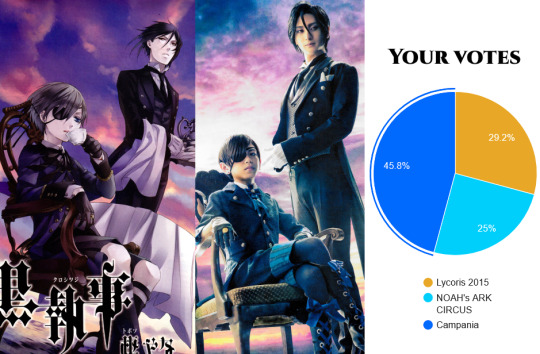
Dear everyone, as per Anon’s request, I shall analyse a Kuromyu and discuss the Lost and Wins in Adaptation. The results of your democratic votes (comments and asks) are out, and the winner is TANGO ON THE CAMPANIA! In this post I shall only be discussing character/plot influential changes, so no stand-alone comedic sketches will be included.
This is going to be a very long post because there’s just so much to unpack. But feel free to read it in bits, or skip to the part you are most interested in (but do come back later though (ÒvÓ)b). This post will include the following sections:
What makes a good adaptation?
AberHanks - Expert Glue and Filler
“Just like my family!” - One line, many messages
Grell - A Capable Career Woman
An unfortunate Sacrifice
Raw Trash Demon
Active Inclusion Midfords - Manga Fix?
Reunion and Aftermath
Afterword
I promise you the analysis will make you love TotC even more!

1. What makes a good adaptation?
2.5D wouldn’t exist without the 2D, so it is essential for any 2.5D producer to prove to the fans the producing side understood the source material using their form of medium. Changes are inevitable, but the key is that when things are changed, the core of the original needs to remain intact.
Theatre as medium’s biggest disadvantage is its strict time constraints. Whether the producers are capable of adapting a story within the time constraints without it feeling like a quickly duct-taped patchwork is what distinguishes a good adaptation from a bad one. The scriptwriters have no choice but to sacrifice parts to tell a concise story, but the art is in skillfully choosing what to yeet. The musical does need to be able to stand on its own without new audiences going “what?”, after all
2. AberHanks - Expert Glue and Filler
The most obvious difference between the original manga and Tango on the Campania is the addition of Aberline and the musical original, Hanks. In Tango on the Campania they are very cleverly employed to tie the musical together within the time constraints.

Ronald appeared before the Campania Arc, but it wasn’t before this one that he gets his own proper introduction. What the manga readers and musical-only audience have in common then, is that at this point of the story, Ronald is almost equally new. The line: “if we get to meet again, alive, that is” is a very effective way to introduce Ronald’s chipper but cynical personality. In the manga Ronald’s conversation partner was a passenger who fancied Ronald. It would have been a waste of stage time to adapt the third class setting and introduce this girl too, but skipping the line entirely would not do Ronald’s introduction justice. So the script writers cleverly used AberHanks instead, and when Ronald delivered the iconic line, the impact is still the same as in the original.

Additionally, AberHanks are supportive roles in them being police officers who help combat the zombies. The historic Titanic had a really poor survival rate, and that’s without dealing with murderous zombies. In Campania however, that’s a different story. I would argue that Aberline and Hanks evacuation efforts, along with the Formidable Midfords greatly increased the survival rate of Campania passengers.
This addition is a brilliant three-birds-one-stone move. This firstly shows that despite AberHanks being the comic relief, as the police they are not there to fool around. Secondly, by explicitly placing the Midfords along literal fighters of crime, the audience also clearly understands what the Midfords - the Chivalric order - are: fellow fighters of crime.
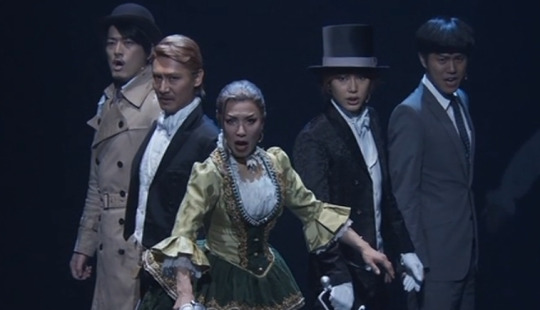
Thirdly, the gentleman’s code of evacuation is children and women first, and AberHanks would undoubtedly also have heeded that code. And yet Frances was there, and AberHanks never attempted to evacuate her or doubted her skill. The police and Frances fighting side by side shows the audience that even in the 19th century, Frances is recognised firstly as member of the Chivalric Order, before being ““just a woman in a huge dress””. Don’t mess with her.
3. “Just like my family!” - one line, many messages.
A very small but game-changing alternation is when Ciel was trying to convince Lizzie to remove her dress to benefit escape. In the manga when Lizzie refused, O!Ciel immediately rips the dress, saying that once dead she won’t be able to wear any dress, because death is the end of everything.
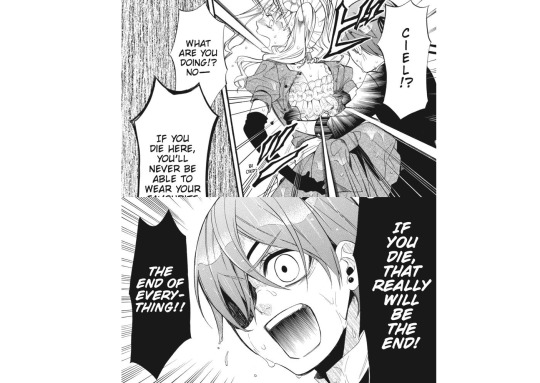
In the musical with real child actors they couldn’t very well reenact this scene, so instead they gave Ciel the line: “Everything is over if you’re dead, just like my family!”
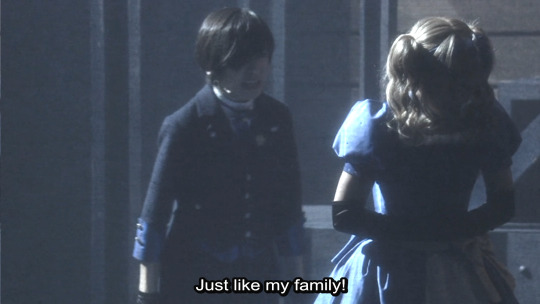
In the musical, Ciel doesn’t touch Lizzie, which is very clever. When someone refuses to remove her clothes, it is because she feels infringed, exposed and/or unsafe. If somebody doesn’t do something out of fear, what you need to do to convince them is to minimise that fear. By forcefully ripping her clothes, MangaCiel only made Lizzie feel even more infringed.
Instead of touching Lizzie, MusicalCiel appeals to Lizzie’s empathy. By making Ciel say “my family” to Lizzie, both audience and Lizzie are shown/reminded how Ciel had tragically lost his family, and cannot afford to lose more. At that time of the musical, new audiences wouldn't know yet what Ciel had been through. So when later the Cinematic Record of Sebas started, “just like my family” also functions as an effective foreshadowing of what would later be revealed, avoiding Ciel being in a cage looking like it came from nowhere to new audiences.
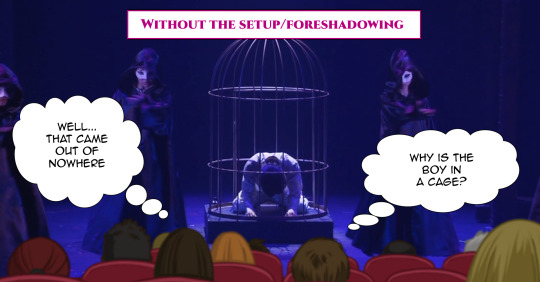
One could argue that Ciel’s phrase was emotional manipulation, yes... but it was a literal life or death situation for the objective good of everyone. And besides, we all know who our Trash Lord™ is; manipulation is part of him.
Ciel had yelled at Lizzie, and immediately he turned around, clutching his chest. It was such an impressive moment because it showed how that blow Ciel dealt was a doubled edged one. Lizzie was clearly hit too, and very quickly she realised her own fault and apologised. Then the most fun part for the audience is to consider whether this was Ciel’s genuine reaction, or whether that was all part of his acting skills in manipulating Lizzie. I say both are equally likely! (Oh Reo, you brilliant little...)

I personally consider this alteration superiour to the manga original.
4. Grell - A Capable Career Woman
Per Yana’s direct request to Grell’s actor, Uehara, she asked him to portray Grell as a capable career woman because Yana admitted she failed to do so herself.
Most of Yana’s request was fulfilled simply by Uehara’s acting and respect for Grell, but there is also one tiny line added to her script which emphasises her focus on her job. “I’m dropping you!”

Nobody on the Campania had time to fool around because it was literally going down. Grell had her job to do, and yet Rian thought it a good idea to withhold information from Grell about the method of stopping the zombies. By threatening Rian whose life was at Grell’s mercy with “I’m dropping you”, the audience is very effectively shown that Grell is a no-nonsense woman, and that she knows how to get someone to talk. 👌👌👌
5. An Unfortunate Sacrifice
Some things had to be omitted to fit the stage time limit, but the most painful omission in my opinion were details in Sebastian’s cinematic record.
A really unfortunate but understandable omission was Ciel reuniting with Tanaka and Madam Red... but considering the time constraints of the musical, shoe-horning these moments in with different actors would have come at the expense of the rest of the musical. Though very sad, it is what it is.

Another omission is Sebas forgetting to spare one assassin to interrogate. In this post I discussed in detail why this omission by the movie adaptation was such a sin. Tango on the Campania omitted that part too, though as a stage medium it is more forgivable than an animated movie with endless possibilities Ò^Ó. Nevertheless it is a bit sad, because this omission takes away that the audience can see how Sebas was just so used to massacring on auto pilot, and how even Sebas himself recognises he needs to learn control.

THOUGH, I must say the musical actually tries to compensate for this shortcoming, unlike the movie. This omission of what showed that Sebas was far from perfect at the beginning, Furukawa compensated by simply being the most insincere, passive-aggressive, unprofessional, arrogant prick he could be.
The audience won’t catch a hint that Sebas used to be no more than a weapon, but they will see how Sebastyun never served a human on close proximity before!
6. Raw Trash Demon
I have already talked about how Sebastyun is a real game-changer on this blog, so I will not repeat every detail again. So here I will only address the significant changes in spoken lines that add to Sebastian’s character before he was fully trained. In this post I discussed in detail how Furukawa portrayed Sebastian’s gradual growth from raw demon to one hell of a butler. Sebas at the beginning was really butler in appearance only, as he was insolent and never knew when to shut his wondrous trap.

In stage format it would have been quite awkward to do a bath scene, so instead the creators replaced it with a wound-dressing scene. Instead of pouring hot water over the boy, Sebastyun is now scrubbing his master’s skin off. When the boy protests, rather than immediately apologising like his manga counterpart did, Sebastyun just shoves the feedback right back down the boy’s throat. “You’re making too much of a big deal out of it.” Here we see how Sebas is not there to serve his master, he’s just doing his thing because he has to.

Another line that is musical only is when Ciel’s stomach rumbled, and Sebas laughed his arse off, saying: “what an inglorious sound!” In the manga Sebas started a high-horse speech about human weakness, which was quite bold already. But he did not seem to dare straight up humiliate his master for a basic bodily need.
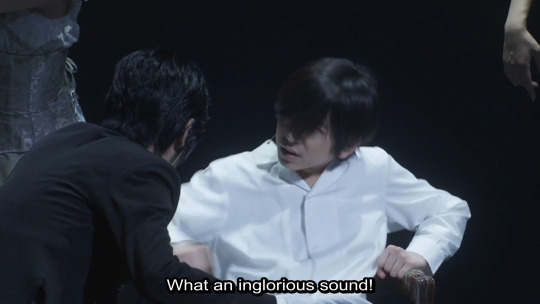
Sebastyun however? Balls of steel.
He humiliates his master, can’t apologise for shit, and when he says things in compliance with his master, it’s in a tone of: “well, screw you too”. Sebastyun was so bad at his job that Ciel too was given another line that wasn’t in the manga: “The preparations of a day’s meals is part of a butler’s job”.

Sebas had just criticised his master for being a useless kid, and now Ciel makes a comeback with the line: “well, you don’t even know what your literal job is, let alone how to do it.” The addition of this line is very powerful in my opinion, because it quite effectively compensates for the omitted scenes of Ciel and Sebas both sucking at their respective roles.

When O!Ciel commented on Sebas’ awful cooking, MangaSebas seemed quite willing to do his job well, and immediately offered to fix his mistake. Sebas does not apologise, but he does show that he made a mistake in not being considerate enough of Ciel’s current condition.

Sebastyun however, couldn’t apologise for shit at the beginning. Instead of showing openness to feedback, he immediately externalises by making humans the problem again, rather than his own lack of cooking skill. No wonder Ciel smashed that table with such aggression!
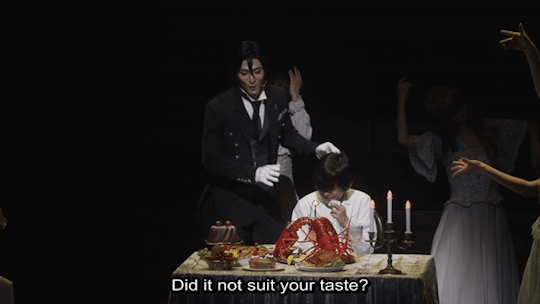
Another changed line is Sebas bringing his master hot milk after his failed dinner attempt. Originally Sebas did so potentially as an attempt to show his readiness to do better at his job. He explains that he does so out of consideration for the well-being of the boy.
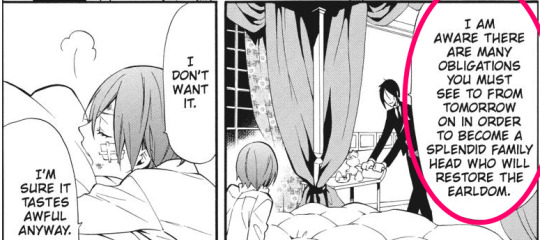
In the musical however, Sebastyun does not say the manga line. Instead he says: “I can’t afford to have you starve to death.” I am not sure whether this was the script or Furukawa’s improvisation, but either way it perfectly shows yet again, how Sebas is not there to serve his master, but to just get his tasks over with.
This is a very short but efficient alternative way to retell how Sebas especially at the beginning was not very enthusiastic about being summoned, as analysed here from the original Japanese manga. Sebas is not like: “(UwU) gimme more orders”, he’s like: “(ಠ_ಠ) what is it this time?”

A small addition that was definitely an improvisation was Sebastyun sitting down on Ciel’s bed, and the boy pushing him away. (At the beginning of the run Furukawa didn’t do that yet. The first time Furukawa sat down Reo just moved aside and gave Sebas a nasty look.) Here it also reemphasises how little Sebastian understood of what was done and NOT done as a servant.
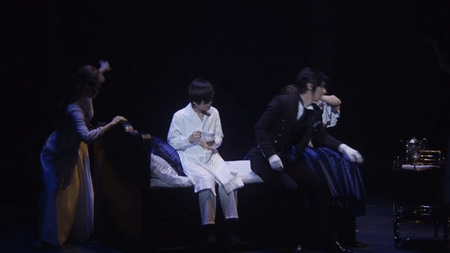
A final, noteworthy addition in the far beginning of their contract was Ciel saying that he acknowledges both he himself are the demon are still fakes. The boy says this line after Sebas had brought him hot milk which Ciel appreciated.

Ciel calls his butler forward in a soft tone, and Sebastyun just looked so self-congratulatory, self-satisfied, he adjusted his suit, standing all ready like: PRAISE ME! (●´ิ∀´ิ●)✨

Yeah no... you wish.
In the manga this line doesn’t exist, so Sebas is simply surprised to hear the compliment, and then his master just splashes the cold water right over him.
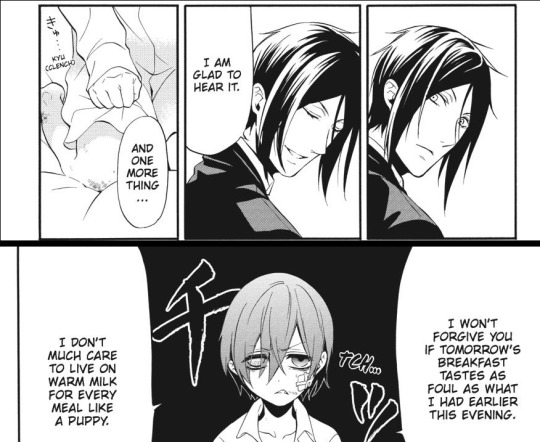
7. Active Inclusion Midfords - Manga Fix?
The most dramatic and influential change to the musical is the active inclusion of the Midfords. It is an entire scene that was added to the musical, so it is a bit impossible to unpack everything in this already very long post. So here I will only address the most game-changing alterations.
Yana Beaten to the Punch, strike 2 and 3?
Now many chapters later than the Campania Arc, we know that the Midfords had been the legal guardians of Ciel after the death of his family. But even before the release of the chapter, we’d see in Sebastyun’s Cinematic Record how the Midfords were very involved with their nephew. This shows how much respect for the manga the musical producers had, and how well they understood their source material that they too could beat Yana to the punch. Strike 2!
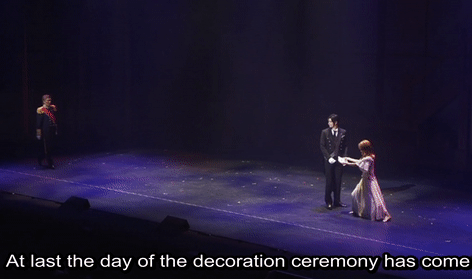
Both Midfords were present before and during the decoration ceremony. And Sebas bows deeply, thanking them sincerely for their aid all this time. Sebas cannot lie, so when he says “sincere gratitude”, it really was sincere. Alexis responds humbly, saying that it’s simply the right thing to do.

Not only did the Midfords aid Ciel in his reintegration into the world, Frances also showed the audience and Sebas she knows exactly what she is preparing the child for. Frances says she understands how cruel it is for the young Ciel to do what is expected of him, because being Earl means more than wealth and power. It is: “shouldering the burden and name of ‘the Queen’s Watchdog’.” The musical also does a great job at linking Frances’ position as the previous Watchdog’s sister, to being the legal guardian of the future Watchpuppy.

I have seen many manga readers talk about how they found Frances’ involvement insufficient in the manga, and I understand. She has a very small role in the manga, so we don’t know what she has or hasn’t done to help. But in Tango on the Campania, we do get a much clearer sense of the Midfords’ role in Ciel’s life.
Ciel was still mid-preparation before the start of the Ceremony, but Frances and Alexis had already arrived to keep a parental eye on him.Ciel is surprised, but Frances responds with: “it would set a bad example if the star is late”. Though it is but one short phrase, the script writers shows (not ‘tells’) how she is there because she wants to make sure Ciel’s decoration will go smoothly, as well as that her own role is to set an example for Ciel by being on time herself.
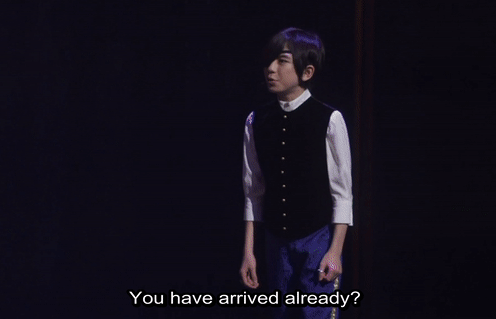
This is possibly a reference to what Sebas says to Frances in chapter 14, how he wishes her to be his master’s example. Except that here in the musical, it is Frances who takes this initiative, which in my opinion is the superiour way.
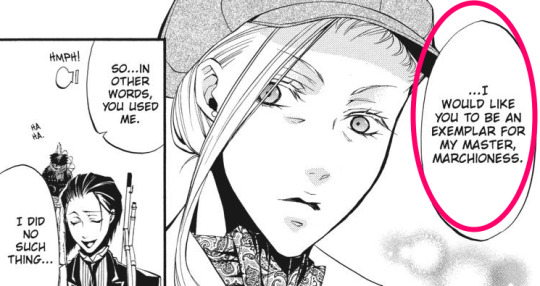
When Frances commends Ciel for his courage of returning to fight, Sebastian adds: “The most opportune chance for counter attack is when the opponent strikes. That is what milady Frances had taught him, the Young Master said.”
To which Frances is quite surprised to hear, and incredulously she says: “Ciel said that?” This makes one suspect whether Frances really said those words to supposedly Real Ciel. It would be very funny if Sebastian (accidentally) gave Frances a hint of his master’s real identity. I am not sure whether this is an implicit hint that Frances might have started suspecting Ciel is not the Real Ciel. Some have theorised Frances has the deepest suspicions among everyone. If that turns out to be true, then TotC might have beaten the original manga to the punch again. Potential strike three!

Another change is the replacement of Madam Red with Alexis. This one is just a very pragmatic change, because the phrase “To Ciel you are already as good as family” is very iconic and important and shouldn’t be left out. But getting a Madam Red in here out of nowhere would require time-consuming exposition. So by giving this phrase to Alexis instead, the musical effectively solves two problems in one go.

8. Reunion and Aftermath
Another addition to the original manga is the reunion on the rescue ship, just like the the movie adaptation of the Campania Arc did. After all that has happened it is very nice for the audience to see the emotional reunion and the aftermath. In the manga the Arc ended with Sebas and his master on the rescue boat, and it had a very nice, open feeling to it, I absolutely love it! 💖🚤
Audience Considerate Story Telling
To a musical-only audience (which TotC had a lot of because of the collaboration with TOHO), the opening ending might have felt a bit abrupt. These musical-only spectators don’t have the Arcs after the Campania to know for sure Sebas and Ciel went home safely, and that life would just continue. Nor would they know for sure what kind of impact the enormous revelation of Undertaker being a reaper would have on our protagonists. Had the non-manga audiences been given the same ending as the original, then it might have looked a bit like this to them.

Also considering the musical medium, any (Japanese) audience would want a satisfying finale song to wrap everything up. (Kuromyu21 not having one was a real complaint among JP spectators). And after the dramatic brawl song of Sebas fighting the zombies on that boat, you can’t very well pull another song on that tiny thing again. Okay, the song TotC did settle with for the finale song was......very disappointing in my opinion as it reminded me more of a Disney parade, but it at least had a song.

Emotional Full Circle
Despite the song being quite unfitting, the emotional reunion really, REALLY hit hard. When Lizzie says “welcome back” to Ciel, it was a perfect full circle back to what Lizzie couldn’t do 3 years ago.
In her flashback of 3 years ago when Ciel returned to her, the boy lifelessly said: “I’m back... Elisabeth”. Lizzie however never responded with “welcome back” because she was too preoccupied with something just feeling off.

In the musical reunion however, unlike 3 years ago Lizzie was fully emotionally equipped to genuinely welcome her fiancé back, and Ciel too happily responds: “yeah, I’m back, Lizzie”, using Lizzie’s preferred name.
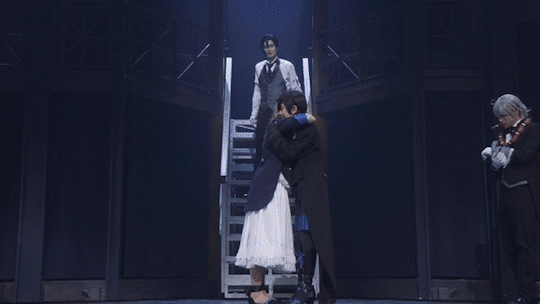
Sebastian’s Aftermath
The reunion is but a simple addition, but it allows the musical to show the impact of such a traumatic event on the omnipotent demon butler.
The Cinematic Record showed how cocky Sebastyun was, and how he didn’t have a single worry in his life. After Undertaker had fatally wounded even the demon however, Sebas became a different person. In the finale we see Undertaker silently disappearing into the shadows. Sebastyun wasn’t even entirely sure whether Undertaker was there, but at the merest suspicion already you see him flinch and twitch. This shows how from now on Sebas has become a person who is on edge.
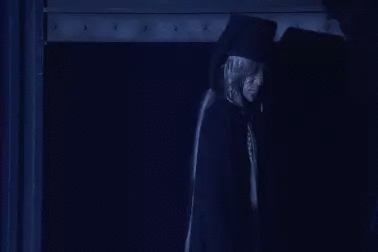
I mean, what’s the point of telling an event if the event doesn’t impact the story and characters, right? In this way too, the inserted aftermath scene skillfully wraps up an overwhelmingly eventful story.
9. Afterword
Well, thank you for reading this looong post till the end! As discussed in this post, TotC did a wonderful job at adapting an existing story with consideration of its audience and medium.
The largest obstacle of the theatre medium is time constraint, so the makers have to sacrifice parts. In what was sacrificed however, they more than sufficiently compensated by including parts outside the Campania Arc into the musical, without harming the integrity. This shows just how much respect and knowledge the TotC team have of the source material.
As a musical adaptation, it is an exemplary production.

Related posts:
Hyper Detailed Development - The Art of Kneeling
That Demon, Skin Crawling
That Butler - Punchable
Lost in Translation II - Sebastyun’s Butlernese
#Kuromyu#Comparative analysis#Tango on the Campania#Campania#Musical#Sebastyun#Furukawa Yuta#Uchikawa Reo
130 notes
·
View notes
Note
i read the first tales of the city last week after picking it up at an out of the closet (usamerican gay thrift shop chain) (i refrained from picking up any pulp sff bc i know i usually don’t get around to reading it, and any books with hairy shirtless men on the cover bc i was embarrassed, but like. the gay cashier isn’t going to judge me so if there’s anything left next time i go in... anyway) do you think i should read more of the series before gawking at the show
Great question ^_^
There's a couple of different answers to this:
1) In terms of continuity/canon, the Netflix TV series is set in the present day as a sequel to the book series. But it's a free adaptation, and diverges from the canon whenever it feels best to them.
It doesn't matter that much if you haven't read the series; the concept is, as in the books, ensemble cast of intertwined tales of queer chosen family in San Francisco - and that's the sort of thing you can pick up at any stage. And I'm not convinced that the new series meaningfully constitutes "spoilers" either, because it's so clearly a parallel canon rather than a replacement or continuation.
THAT SAID. A bit like Picard, it leans heavily on sentimental nostalgia; I'm not sure why you would care enough about the indulgent, semi-deification of the characters if you weren't already invested in them.
2) There's also an older TOTC adaptation, with the same cast, which I haven't seen - but would still like to.
3) In terms of pleasure: I just counted on my shelf, and I own all nine TOTC books plus one of his others. I think the book series is fantastic. In contrast, I watched three episodes of the show and haven't bothered to finish it.
The books are a series where you'll either read one of them, or all nine. The first book is an essential part of our literary history and culture; but if you buy what he's selling, it's pretty irresistable.
TOTC books are an interesting historical document - especially the first few which have a slice-of-life wit and a parodic eye. "The City" is Maupin's great love affair, so it's a document of that moment and that place - as well as notable for its groundbreaking representations of LGBT characters.
Beyond that, it's a string of sausages story and you stick with it because you love the characters. Maupin isn't immune to a very silly plot twist, but his observational character writing is always excellent; he seems to struggle with finding the narrative on which to hang his character work. Expect a soap opera twist at the point 75% through the novel when he thinks just having characters talk to one another isn't enough and something ought to Happen. But you know what? It is enough. I wish he had had the courage in his observational work to let it stand on its own.
I also think he has one of the most interesting treatments of AIDS in literature. His books are semi-autobiographical, written contemperaneously, and it's telling to me the way he chooses to almost step around it - for example, killing main characters in the time between books, so as not to tell the story of their illness on the page. In both TOTC and the Night Listener, he explores HIV through the experiences of straight characters. You get a real sense of him needing to approach this topic from the side, rather than head on. That's important to me, in and of itself, as a document of that part of our history.
4) I think the best run is books 5-7: Significant Others/Sure of You/Michael Tolliver Lives, with the last of those being the one I've read to death.
I didn't get on with book 8 (Mary Ann in Autumn), but it has a nice subplot about young gay trans man Jake connecting with this Mormon youth pastor missionary who may-or-may-not-be-gay. Book 9 (the Days of Anna Madrigal) was a travesty, absolutely terrible. The more you learn about Maupin's life, the more you realise the books are literally just things that happened to him - including having disappointing sex with a closeted film star. The reality of Book 9 is that Maupin is an married man living a quiet life, and not much is happening any more.
So if you're reading, you can stop after book 7.
5) One of the most important things about the series is how connected Maupin is to the world he's writing about. Filled with knowing references that his gay readers of 1974 would have understood, to people and places and bars and events and things you see on the street there.
The Netflix has attempted to replicate this by updating it for modern queer culture and modern SF. I don't think the writers are part of that world, it doesn't read as "real" to me.
For one thing, adjusting Jake from a young gay trans man who hooks up with the poly, married, older cis male protagonist - courageously, but with confidence - to one of the "young people" characters, having relationships with other young people newly created for the series. There's a subtle othering going on here, suggesting Jake's life is a "young person's thing". But in one stroke, they've erased the age gap, the open marriage, the long history of gay trans San Franciscans as an equal part of a historic community...trans lives are not validated by cis people's acceptance or by sex, but when you're adapting the longest-running openly gay character in literature, the character who comes to embody the life of a gay man over the course of 3 decades of books, and you choose to write the trans characters out of his bedroom, and into this nebulously modern queer space instead, you are Making A Choice.
I had horrible experiences in queer spaces, so the rosy-tint everything has doesn't read as real to me; and where are all those trans young artists living in San Francisco anyway? Yeah, Anna and Edgar are running an Instagram account, but the tale of the city is not the tech revolution, but the people crushed underneath it.
You know, what happens in the book series at the moment we move into the present day is that Mrs Madrigal has to sell her house - that iconic house, the house on which everything centers - because she's an older woman in a rapidly gentrifying city that's shifting underneath them, and she needs the money.
But in the show, there she is, at Barbary Lane, luminous and surrounded by loved ones; it's giving us what we "want", part of the Maupin brand. But Barbary Lane is not the house, but the way the people within it create home for one another there. I think what it misses is that these are tales of the city, and like any lover, you adore it even when your heart is breaking - you have to be honest about that which you love, in all its imperfections; Michael Tolliver Lives explores that a little in 2016, what it means for the city to be gentrifying, but a series made in 2019 shies away from it?
To me, this sort of exemplifies the queerwash cowardice of the series. It's something hollow draped in a rainbow flag. Maupin was never cruel to his characters - but he never lied about them either. The series is safe, unwilling to criticise, unwilling to take risks, unwilling to look at the modern city or modern queer life with a clear and honest eye, it's like eating a wad of colourful cardboard.
2 notes
·
View notes
Text
7 Initiatives by Pradip Burman to Save the Environment
At 80, Mr Pradip Burman is an entrepreneur, philanthropist, environmentalist & prolific businessman, founded Mobius Foundation. It is a non-profit organisation that works towards sustainable development & spreading awareness among people about why we need to walk on this path.

The founder strongly believes that we must sprout sustainability awareness in society and showcase the irresponsible activity we do without thinking about our environment for petty gains.
For a sustainable lifestyle, we must educate children & make some profound decisions so that they can be soft and friendly towards nature because running behind materialistic comfort only takes us towards our end.
Therefore, Pradip Burman began his initiative to save the environment.
The Initiatives by Pradip Burman
1. Mission Sustainability: Population V/s Planet
Human population growth is the root of all environmental-related problems. However, this is often left out of the conversation. We can fight to lessen climate change, clean up pollution & stop habitat loss of biodiversity. But these all cannot be achieved until we address or control unsustainable population growth. The first thing that we can do is talk about it with the people.
To achieve this goal, Mobius Foundation began its journey by partnering with Zee Media and WION Channel to start conversations nationwide to explain how population growth is destroying natural resources and greenery.
2. Project Aakar
Project Aakar is another initiative by the Mobius Foundation and a part of the Sustainability Solution program that works to promote awareness among women for family planning.
As the Earth is burdened with the growing population, they require more natural resources to consume, such as water, food, energy. This growing demand is depleting the planet’s resources.
Through this initiative, Mobius Foundation is supporting the Government of India’s commitment to stabilize the population. It is a crucial step to reduce global issues, extinction of species & carbon footprint.
3. Gyan Anant Vidyalaya
Pradip Burman has established a sustainable school called Gyan Anant Vidyalaya to teach young children about experiential learning by planting trees, and to live a sustainable life through curriculum activities.
The school gives knowledge through activities like conservation management, forestry, organic farming, etc.
4. Project Sanjeevani
To increase green cover in the states, Mobius Foundation, under Project Sanjeevani, began a mass tree plantation drive in 2018 and has planted 5000 saplings in Haryana.
The growth of greenery will not just reduce the greenhouse gases & other carbon footprints, but it will also help restore the ecological conservation projects for plantation drive.
Many local schools, students, farmers, Kisan club members and NGOs join the plantation drive to improve our Earth’s health.
5 .ICSE India
The International Conference on Sustainability Education (ICSE) was jointly established by Mobius Foundation and ‘The Climate Reality Project’ in partnership with the UNESCO New Delhi office. The initiative addresses the challenges that are halting the path of sustainable education.
It is empowering learners with new values, skills and attitudes that take the entire society towards sustainability. The leaders, educators, practitioners and policymakers are sharing innovative ideas, practices, case studies and policies to make a better decision for ‘Education for Sustainable Development, Environmental Education and Climate Change Education.’
6 .Training of Trainers on Circular Economy (ToTCE): The Educational Institutions
ToTCE is an empowering education programme that brings change to education with circular economy knowledge. In this initiative, Mobius Foundation invites collaborative efforts from practitioners, educational institutions and leaders to strengthen the education system and practices to provide knowledge beyond formal education. The programme is also designed to induce core circular thinking and values for teachers, lecturers, and academicians to teach future generations.
7. Khushal Parivar Diwas
Mobius Foundation began Khushal Parivar Diwas in sync with the UP government’s initiative, family planning. It organises camps at Trivendigani CHC and Kaisarganj CHC in Barabanki and Bahraich district to spread awareness and showcase how contraceptive methods can help them in planning a family.
It will increase the awareness among couples, help them plan a family & reduce the birth rates so that they can live a fulfilling and happy life.
Source :- https://pradipburmaninitiatives.wordpress.com/2021/11/11/7-initiatives-by-pradip-burman-to-save-the-environment/
0 notes
Text
Tango on the Campania (Ishikawa run) Review
This is a fan review of the Ishikawa run of Musical Kuroshitsuji: Tango on the Campania (TotC), for both 3rd February (setsubun special) and 4th February shows. I also had a glorious close-up view of Ciel and Sebastian when they appeared behind my seat. SO READ ON TO FIND OUT MORE!

ABOUT ME
I have been watching Kuromyu ever since the first musical. I am glad to be able to finally watch it live in person after all these years. I am also a huge musical nerd, and am musically and dance trained. I also live in Ishikawa Prefecture, Japan, right now.
I attended the opening show on Saturday and the closing show on Sunday! Super happy to be part of the special setsubun celebration during the curtain call, and I’ll share more later in this review. My seats were on row 10 (Saturday) and row 18 (sunday), so I am pretty close to the stage!
This review will not contain huge spoilers or a full summary of the entire plot, so you can go ahead and continue reading without dying from spoilers.
OVERALL THOUGHTS

IT. WAS. AMAZING! I was pretty bummed about the circus version last year because the music was just...bad. Pretty sure their entire budget went into the costumes and acrobatics department instead of music
For TotC, It is pretty fast paced but it has the key stuff from the Campania arc! The set is beautiful, the Bizarre Dolls were great, dance choreography marvellous as usual. Kudos to the supporting cast! There was no bad singing at all (unlike in Noah’s Ark Circus). You’ll tear up at the sad parts and you’ll get chills at the scary parts and great singing! It’s THAT good!
There are some slight changes in the Saturday and Sunday ad-libbed parts, in consideration to fans who attended both days. Bless them! <3

MUSIC & SONGS
The music in TotC was so good! But of course, it cannot beat the masterpiece of Lycoris featuring our vocal prowess Akane Liv. Yuta Furukawa (Sebastian) was so good, and his songs really show off his vocal talent.
My favourite song is ‘私は執事、あなたは伯爵’ (I am a butler and you are an Earl), especially Part 2 reprise of this song when Sebastian sings about Ciel’s soul after realising his little Master isn’t content with just being an Earl and wants revenge. The lyrics then changed to ‘I am a demon butler and you are a fake Earl’. So so SO GOOD!!
The other side characters had very nice songs too, especially the 2nd comic-relief song ‘Ey yo, Ey yo!’ sung by Viscount Druitt. It was hilarious! Druitt is a GREAT singer and in his first song, he did this flamboyant pose and crooned ‘PHOENIIIIiiiIIIX~!’ at his entrance. Yes, lucky dude got to sing two solos! I know some of you may be thinking oh man, a comic-relief song when zombies are killing everyone? Don’t worry! Because the whole second half of the story was super intense, the comic relief song by Druitt was refreshing and helps steer us out of this depressive wave. This song ended with Ciel, Sebastian, Grell, Ronald doing the fabulous mass Phoenix pose that is exactly like in the manga! The dancers encouraged us in the audience to clap along too!
The actress for Lizzie sang really well in her solo song too! Her voice was very cute and she kept up the moe-vibe. But her song was really sad and some people cried when she sang about ditching everything to be cute for Ciel.
BIZARRE DOLLS
The Bizarre Dolls (supporting cast) was marvellous! Their zombie-walk was great and their dance choreography was to die for (pun not intended). Remember the basement scene where Ciel, Lizzie and Snake discover thousands of coffins with Bizzare Dolls rising from the dead? The show used a projection screen to project the rattling coffins and it looks really good and realistic! Then suddenly, this screen was raised to reveal a hoard of Bizarre Dolls lunging forward for them. Accompanied by the music, I literally got chills running all over my skin.
To make up for the lack of BIzarre Dolls, extra zombie mannequin dolls were used and tossed around to fill up the zombie numbers on stage.
FLOODING & SINKING SHIPS
Screen projections were used to create many of the effects on the ship. They used a transparent projection screen to project the rising flood-waters as well as water raining down from the ceiling. It was pretty realistic considering they cannot have real knee-length water flooding the stage.
Projections were also used to show the Campania breaking in half and when the ship started tilting as it sank!
KEY/ FAVOURITE MOMENTS
1. The playback of the pre-show announcements featured Reo’s super cute voice. I could see some fans of him squealing when they heard his voice.
2. Characters (AbberHank duo, Midford family, Ciel, Sebastian and Snake, Ronald) entered the stage from the audience exits and not from stage left/right. I am not sure if it is done at other shows or just for Ishikawa. In previous musicals, they did not have character entrances from the audience except for Hank/Abberline.
In the Saturday show, Ciel, Sebastian and Snake appeared and stood behind my seat (to my shock and delight). I could see their gloriousness up close! Reo/Ciel was just scowling and man, Reo is so skinny up close! His black tights made his legs look like chicken legs! Yuta/Sebastian looked utterly (and perfectly) demonic! I swear my heart stopped beating right there and then. Unfortunately, my Sunday show seats were further back but the trio did not stop behind my Saturday seat but instead continued walking towards the stage.
3. The opening for TotC is also different from previous musicals. We usually start the musicals with the contract scene but this time around, we had a Campania song with the characters boarding the ship.
4. The amount of Campania wordplay jokes..god! They were so funny!
(While boarding the ship)
Abberline: I heard they are selling merchandise on the ship.
Hank: What? What kind?
Abberline: Cam-badge (Campania + can badge)
Audience: LOL
-------------------------------------------------
(At the banquet)
Ronald, Abberline, Hank: Kampai-nia! (kampai (cheers) + Campania)
5. Yuta/Sebastian & Reo/Ciel doing the Phoenix pose was hilarious! Reo/Ciel was wearing heels so he was wobbling on one leg. The rich man from the Aurora Society circled Reo/Ciel to make sure he is keeping his Phoenix pose and the audience laughed.
In the Sunday show, poor Reo actually lost his footing but thankfully Yuta quickly caught his hand to stabilise him! It looks so authentic and in-character, and it delighted the audience! I am so sad that this probably won’t be in the DVD release...
6. Ryan Stoker also interviewed the front row audience about what is the most crucial thing aside from life, and the poor lady (on both days) kept giggling uncontrollably.
7. In the scene where Yuta/Sebastian fights the hoard of Bizarre Dolls in the ship’s basement, a giant red silk cloth was run over the audience’s heads towards the stage to signify a bloodbath/ wave of blood. This scene then led to the belated contract scene song!
8. YES. THERE IS AN ICE-BERG IN THE MUSICAL! It is huge, it is fabulous and it had Grell standing on top of it as it neared and crashed into the ship! What a fabulous entrance!
9. Yes, the fan-favourite scene of Sebastian calling Grell a hentai (pervert) is in the musical and it is super hilarious.
Grell: Ehhhh. So mean! I even bought some bromides (of myself) as presents.
Audience: LOL
10. Lizzie’s badass reveal was perfectly executed! She even did the same fighting choreography in the anime movie! She also the same poses in the manga! It was so good and I think Momoko really delivered and a perfect casting choice.
11. Undertaker’s shinigami reveal was really nice too! HIS DEATH SCYTHE IS GLORIOUS!!!!
12. In the stabbing scene, both Reo and Yuta were lifted by the supporting cast so it looks like they are ‘falling’ off from the top floor. The projection screen behind then projected the blood splatter as Undertaker’s scythe stabbed through Sebastian’s torso.
13. My favourite part in the whole musical is when Sebastian narrated his initial life as a butler to Ciel. As we all know our!Ciel is not the real Ciel! Reo actually portrayed our!Ciel very well. He hesitated before calling himself with his dead twin brother’s name. Sebby says 「 かしこまりました/ I understand.」 in the most super lazy, sarcastic and reluctant way, it was super funny. In the Sunday show, Yuta/Sebastian sat on the Earl’s bed after serving him milk & honey, which led to Reo/Ciel shoving him off. Yuta/Sebastian also made a ‘tsk’ sound when Reo/Ciel reprimanded him about cooking everything from scratch like a real human butler should. And as he walked away, he spat out 「クソガキ」(stupid brat) before launching into my favourite song ‘私は執事、あなたは伯爵’ (I am a butler and you are an Earl
14. The final Bizzare Doll fight scene in the middle of the ocean was beautifully executed. You can refer to the official trailer on the website to see how it was done!
15. Grell was more worried about his false eyelashes after Ronald and Grell found a boat. It was super funny!
16. The musical ended with a reprise of ‘私は執事、あなたは伯爵‘ and the Campania theme song.
SETSUBUN SPECIAL CURTAIN CALL
So setsubun was on Saturday and the cast prepared a special curtain call for us! Abberline and Hank did their ad-libbed comedy routine, and here are some of my favourite parts:
Hank:「鬼はoutside!福はinside!」(starts rapping)...あ、でも、鬼がいないので‥ (‘Oni outside, luck inside, ahh, but there aren’t any oni inside here...)
Hank: Oh, look so many oni! (gestures to audience)
Abberline: Oi, don’t be rude! (smacks his head)
Hank: ...you’re right, there is only one oni...(gestures to one poor audience member in the first row)
Audience & Cast: LOL
Abberline:じゃ、「鬼はなし!福は内!」にしてた!(Well, let’s do `There is no Oni, Luck is inside’ then!)
The supporting cast then entered the hall and spread out, they tossed packets of 福豆 at us. I did not manage to catch a packet but the lady beside me did. Lucky girl....

The main cast also threw the packets of beans and Reo/Ciel got too excited and tried to fling the packet further out, and his Phantomhive ring flew out from his finger. He had to leap off the stage to recover it from the first row. The AbberHank emcees teased him about it
How can Earl Ciel do that?
That’s not something Ciel will do? (LOL)l
SATURDAY & SUNDAY CHANGES
As mentioned earlier, the cast made an effort to make every show unique so it doesn’t matter if you attend just one show or many shows. Each show has special changes in the actions and ad-libbed dialogue. Here are some of my favourites:
1. Opening Entrance: On Saturday, Abberhanks appeared together in the audience. On Sunday, only Hanks appeared alone and was super happy. But he met Abberline as he was walking to the ship who pretended not to recognise him.
Hank: Aren’t you Fred Abberline?
Abberline: No, I am Fured Abburraineee...(exaggerated accent)
Hank: No-th-that, besides the accent. The name is the same isn’t it? Fred Abberline!
Abberline: It’s Fured Abburraineee...
2. Banquet scene: Ronald taught Abberline how to pick up ladies, but Abberline was being socially awkward when flirting with them in the Sunday show. The trio only kept drinking in the Saturday show.
3. Ronald & Grell on a boat scene: In the Sunday show, Grell ad-libbed something random. Not sure if he forgot his lines but it was really funny...
Grell: (pauses before gesturing to the sky) Look so many birds, I want to be a bird too...
Ronald: (bursts out laughing)
4. Curtain call: We did not have long thank you speeches on Saturday due to the Setsubun special. But we had it on Sunday for the closing show.
Abberline: TADAIMAAAAA ~! Audience: OKAERIIIIIIIII~!
Congratulations, you made it all the way to the end of my super long review!
I will attend the live-viewing of their final performance at the cinema again on the 12th (just so I can see the set/costumes and all that in super high-definition on the big screen). Also I kinda wanna see the cast start crying when they make their final thank you speeches! Also because they mentioned we will be watching exclusive back-stage clips and I really wanna watch it!
Please, please PLEASE order a copy of the DVD/BLU-RAY. Please support the cast and giving them a well-deserved income from these sales.
The DVD/BLU-RAY will be released in Japan in June 27. You can order it off CDJapan, Amazon Japan or Animate International. I will be buying a copy myself as well!
44 notes
·
View notes
Text
Shapeshiftertale au DUMP!!!
First things first...
The Shapeshiftertale au's setting in its Mafiafell shift does NOT take place in the 1920s, but instead it takes place further into the future in the 3020s.
Hence the reason why Edge/Sans has a collar that would be out of place for 1920s fashion. The furniture is a mix in its fashions since everyone has their own tastes in clothing and outfit placement. Along with the fact that Dark re-entering the au doesn't come off as her sticking out like a sore thumb, as this future setting does have similarities to the future settings of the TOTC Universe before the last events that wiped out the humans and human society.
Them...
Shapeshiftertale au Gaster
Now, you would think that this Gaster would be spooky, mysterious, and a baddie of this au. ((More so since this is an au about shape-shifting.)) But nah, that isn't the case.
The more surprising bit about this Gaster is that he actually takes Papyrus' place. Not as another version of Papyrus, no. As himself, a loving father of Edge/sans.
Gaster, or Pops for his au name ((Which everyone calls him in the au since he is fatherly to a lot of younger people and impressionabley kind to older people. But also just called Dad by Edge/Sans sometimes too.)), is the co-owner of Grillby's and an ex-royal scientist in all au shifts, but additionally a secret mafia boss for the Mafiafell shift. Pops is, again, a very fatherly, kind, intelligent, and ((at certain times, not all the time)) a professional person. Pops is always tired/tired looking, but still keeps up being the good person that he is. He stopped working as a royal scientist for certain reasons and reasons, that will be mentioned later on, but he created both Edge/sans and Papyrus of the au with how own soul and soul essences from the other souls the king provided at the time. After said events, Pops was offered to help with the Grillby's restaurant and bar to better give Pops a new job to work in once he dropped being a scientist.
In story/game for the Undertale/Classic shift, Pops would try to help you through the puzzles that were left behind by his former son, all the while that he knows that the king needed another soul. But as he knew the truth that the king didn't actually need more than one soul to come through, he rather wanted to take the player in to confront the king with the player. However, the player would seem to want to confront the king themselves to open the barrier for everyone.
For the Mafiafell shift, Pops would insist that you join him in his gang to confront the king, but with the player refusing Pops would resort to force. This force would make Pops regretful of what he is doing and decides to let the player have at their own choice to confront the king alone. As risky and painful it seems to him, he rather not force the player to join his gang since he just doesn't like hurting innocent people.
If the player picks to go with Genocide, or a neutral route to kill him specifically, Pops will catch on and REALLY fight. As being a father, it will kick in that he will protect everyone at all cost from the player. Killing him will ultimately and traditionally lead to Edge/Sans facing the player later on. But Pop's last words would be...
"I know what you're doing, either you're doing it for experimental purposes or for sickly fun...just please... don't hurt my son."



Shapeshiftertale au Papyrus
Papyrus, or Shiv for his au name ((Traditionally use to be called Papyrus by Edge/Sans and Pops.)), took the place as the Gaster of this au.
After a few years from being created, where as Both Shiv and Edge/Sans were old enough to do the more drastic things, they became assistance of Pops while he was still a royal scientist. Both bone brothers would assist their father on moving around supplies, prepare certain experimental procedures, and etc.
When Shiv wasn't working, he usually studied and made puzzles on his spare time and as a hobby. The king always admired his work, even asking Shiv if he could embed some puzzles into certain places of the kingdom to ensure their home's safety. Both Shiv and Edge/Sans were admired for their parts on keeping the kingdom safe in their own ways while Pops kept looking for ways to open the barrier when they aren't needed.
That is, until one day, Pops finally discovered something that he thought was the solution to opening the barrier. Something that didn't require human souls. On that day, he would want to test out if the "solution" would indeed work.
Pops asked for his sons to assist him on this experiment of this solution, just in case things were needed for more than one monster to improve the solution's performance. Once the experiment began, it opened a dark portal. No one entered the portal, all three thought the portal itself was extremely suspicious. To no prevail, the portal became a sucking vortex. Taking in everything that came near it.
Pops was almost sucked into the portal, but Shiv sacrificed himself to save his father. He moved Pops away from the stronger wind forces from the vortex, only to disappear into the portal himself. The portal then closes after Shiv was taken.
Shiv was/is stuck in the void.
He stays imprisoned from that day, this leading Shiv to change after such long period of time and reset shifts. The shifts do not change Shiv, as nothing can shift inside the void, but the void itself changed shiv.
Upon the void's emptiness and other supernatural attributes, it lead to Shiv to hallucinate. This the hallucinations lead to Shiv scratching at his eyes, and scratching out his right eye. Along with twisting his mind and emotions. The supernatural attributes of the void lead to Shiv's disfigurement on his body and magic.
Shiv, still desperate to get out of the void, had in mind that magic was the key to get out of the void. After figuring out the void more, he found out that he can take people from the outside world of his au and into the void. Leading lonely strangers astray, and going for the kill to take them into the void to absorb/suck away their magic in order to get out of the void.
Shiv would eventually have enough magic to get out of the void, but due to the void's damaging effects on his mind, it twisted him enough that he developed a thirst and dependency on magic from others. Thus, he sticks with preying upon others to take away their magic.
Players facing Shiv, and have LV higher than one, will ultimately drain away the player's health stat back into LV 1 health status since EXP is made up of the magic the player gained from the monsters. Shiv's attacks can leech off of the player more and more the player gets hit by Shiv's attacks.
But, in any case, Shiv is still in the void.
The only thing that keeps Pops and Edge/sans reminded of Shiv's existence, is that Pop's always wears Shiv's scarf he use to always wear before the accident.


#skeleton oc#Skeleton#skeleton art#my OC#my universe#my au#TOTC#Trilogy of the Company#TOTC Epilogue/Undertale Story#undertale#undertale au#undertale papyrus#undertale gaster#papyrus#gaster#Shapeshiftertale#fun TOTC facts#TOTC Story#TOTC writing#my art#my drawing#My Story#My writing#art#drawing#story#writing#traditional art#traditional drawing#pencil art
47 notes
·
View notes
Note
Hi Chibimyumi Could you make a comparison between the two actors who play Snake in the musicals. Which one is your favorite and why? Thank you
Dear Anon,
Yeah sure, it’s a pleasure ^^
Though, the two Snakes are very hard to compare because they are basically completely different characters in the two arcs, and also fulfill entirely different roles in the musicals respectively. As such, this comparison will focus more on the technical aspects of the actors instead of characterisation.

Before we start, I shall first list the points that would result in an unfair comparison if not accessed differently for this review.
1. Stage time
The stage time the two Snakes are given in their respective musicals is very different; the more stage time one has, the more opportunities to shine. Snake plays a significantly larger role in ‘Noah’s Arc Circus’ (NAC from here on) than he does in ‘Tango on the Campania’ (TotC).
2. Role and purpose
Snake is an altogether different character in the Circus arc than he is in the Campania arc. In the former, he is a timid character who hides his fears through distance. He feels at home at the Circus, but his ‘home’ was infiltrated by strangers, hence his behaviour was more aggressive.
In the Campania arc however, he has already spent a bit of time in his new home with a new master. He feels like a fish out of water, but is eager to get accustomed to his new environment. He has opened up entirely to his ‘new family…’, and has less to hide. In short, his edge has been smoothed out significantly.
Because of this stark contrast in character change, I shall only make comparison based on how well the actors managed to convey their respective purposes.
3. Stage role
NAC Snake was given much broader varieties to his performance than TotC’s did. In NAC, Snake was allowed to act, dance, sing, improvise, and even partake in comedic scenes with AberHanks (Gosh he’s funny!) TotC Snake however, only had acting parts. As such, I shall only compare the Snakes based on acting quality.
‘Noah’s Arc Circus’ - Tamaki Yuki
Good things first!
Tamaki is a charisma bomb. Of course his costume and make-up are superb, which does help, but his charisma alone makes him look like he walked right out of the manga. Tamaki conveys this other-worldly charm fantastically. He has this energy that piques our curiousity, and has the star power befitting a first tier star from a popular circus. I immediately understood why people would travel miles and pay to see Snake Man at the Noah’s Ark.
I mean, look at him⇊.

He also carries this very cold aura which is very accurate to the emotionally distant Snake from the Circus arc.
The greatest feat about Tamaki is that he is a fantastic voice actor. He has an incredible vocal range, and is capable of impersonating old and young, masculine and feminine, wild and tame, you name it. The emotions he is capable of pouring into his voice acting are also superb; the quality is almost comparable to professionals who do voice acting for a living.
On the other hand…
While Tamaki’s voice acting is superb, his stage acting sure has some space for improvement. Most have probably seen NAC (or any Kuromyu) on a DVD recording, and thanks to the editing his role is adequately conveyed. As a stage actor however, he really under-performs.
Tamaki is mostly static on stage; he only uses his voice to play the role, but seems not to have considered the medium of body language much.
If we look at this scene ⇊ we, we only see Snake walk up to Sebas and we can tell the snake on his left arm is talking. If we switch off the sound and/or subtitles, we can’t tell what message he is trying to convey from his body language. Is it a positive, neutral, or negative message? We are clueless. I remember sitting there in the theatre looking at snake, but there was just nothing to see.

In this scene ⇊ Wilde is threatening Sebas that if he so much as set one foot inside, he’ll sink his fangs into his neck. While Tamaki’s emoting expresses the aggression more or less (on recorded footage), we can’t tell that it’s a threat that he is making without the spoken message. In a theatre, all the audience could work with was his voice acting. This conversation with Sebas would really have benefited from Snake hunching down in preparation for a charge, for example.

In this scene ⇊ Snake is impersonating three different snakes. But from his body language we also can’t tell whether multiple snakes were talking, or when he switched the voice from one snake for another.

In short, Tamaki’s acting might be more suited for a film media, rather than theatre. At the beginning of the Furukawa Era Kuromyu, I’ve seen a lot of people say they can’t stand Yunbastian because he was moving so much. Yes, it is quite dramatic on footage, but that, people, is what is necessary to convey a message in a big theatre.
(It is quite a common quirk that theatre actors have when they get film roles. Most theatre actors who play for a movie have the experience of being yelled at by the director: “you speak too loud, don’t make such big movements, face your opponent, not the camera!”)
‘Tango on the Campania’ - Harashima Motohisa
Good things first!
Harashima’s performance mostly shines where Tamaki’s paled. His body language is very good; without having to hear or understand his lines, we can tell what emotion he is expressing.
In this scene ⇊ where Snake is being treated like a laughing stock, we can tell very clearly from his posture and movements what he feels. He walks and turns away from his master, communicating shame of himself. The hand he flings into the air as well as him shaking the head express Snake’s powerlessness and defeatism expertly.

Harashima’s approach of how to represent his snakes is very different from Tamaki’s. Tamaki mostly focuses on the voice acting for his snakes, while Harashima uses his entire body to ‘impersonate’ (insnakernate?) his companions. In this scene where he says: “understood,” to Sebastian, he uses the arm and the slight tilt of the head to communicate consent, fully representing Oscar in voice and action (had he had arms). Only afterwards did he return to normal ‘Snake’, and points at Oscar, signifying who spoke.
In short, Tamaki!Snake is the interpreter of his snakes, whereas Harashima!Snake is the proxy agent of his snakes.

Harashima’s emoting is also very vivid. In this scene ⇊ he expresses his scepticism towards Lizzie’s identity as daughter to the head of the Chivalric Order. Through his emoting which is further strengthened by his superb body language, he allows us to immediately understand that he doubts something, without hearing his spoken lines.

Harashima is not just the proxy agent of his snakes, he is also a character on his own. During the finale of the musical, we see him interacting with the snakes, caressing Emily and snuggling up to her to give each other comfort. This is really where Tamaki pales in comparison, because Tamaki!Snake did not seem to love his snakes as much as Harashima does.
This moment ⇊ is one where we see the superiority of Harashima’s physical acting. Snake is still preoccupied with Emily, but Oscar already dashes forward on his own, seemingly yanking Snake’s left arm with his eagerness. “Wait! This smell!” Oscar says, and Snake reacts to Oscar’s pronouncement.

Snake in the Campania arc has mellowed down and opened up drastically, and Harashima manages to capture that energy quite well. His bond with his snakes as well as with his new master is something this actor manages to convey very well.
On the other hand…
Just like Tamaki, Harashima pales where Tamaki shines. In the Campania arc Snake does not need to be a star like he used to be in the circus, so there is no need for gaudy expressions. But Harashima!Snake’s presence seems quite weak in comparison to his predecessor. While his acting is superb, he is not very good at keeping the audience’s attention on him. Snake is a timid and silent character, but such characters too can have stage presence. When he is in the background, his acting might have benefited from some ‘active’ passiveness… do you understand what I mean? He could coil his shoulders a bit more, or bite his lips, or hide behind his snakes, for example.
Though Harashima’s voice acting in terms of emotion is great, his range is not as great as Tamaki’s. Perhaps it is because he damaged his throat (like Furukawa said in the curtain call, and if that’s the case I’ll take my words back), but Harashima’s voice was sore at all times. He did manage to show the contrast between characters of the sweet Emily, the energetic Oscar or the dominant Wilde, but he conveyed the ages of the snakes less well than Tamaki did.
Conclusion
I think both Snakes characterised their respective roles fantastically; they were both the Snake they were supposed to be. Though both are fantastic, I would say I do have a preference.

Overall, I would say Harashima is the superiour Snake because he fulfills the purpose of his media (stage theatre) better than Tamaki did. Tamaki’s performance mostly shines in his superb voice acting and stage presence, but these two alone are not enough to be a good ‘stage’ actor in my opinion.
While Harashima’s voice acting and presence pale a bit in comparison to Tamaki, his body language allows even the spectators in the back of the theatre to enjoy and understand Snake well. And that, ultimately, is in my opinion the prime objective of any stage performer. You perform for the entire theatre, not just the few lucky ones on the front rows.
I hope this was satisfactory (*´▽`*)ノ
#Kuromyu#Snake#Noah's Ark Circus#NAC#Tango on the Campania#TotC#Kuroshitsuji#Black Butler#Musical#Harashima Motohisa#Tamaki Yuki#Analysis#Character analysis#stage analysis#comparative analysis#theater
41 notes
·
View notes